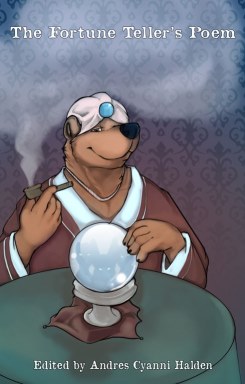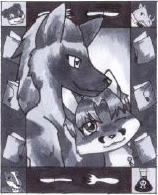Review: 'The Fortune Teller's Poem', edited by Andres Cyanni Halden
 Monday's child is fair of face,
Monday's child is fair of face,
Tuesday's child is full of grace,
Wednesday's child is full of woe,
Thursday's child has far to go,
Friday's child is loving and giving,
Saturday's child works hard for a living,
But the child who is born on the Sabbath Day
Is bonny and blithe and good and gay.
Wikipedia says that this nursery rhyme dates back to at least the 1570s, and that, before it was printed and ‘fixed’ in the 19th century, there were many variations.
Andres Cyanni Halden uses this standardized version. He has gotten seven authors – six plus himself – to each write a Furry story around one of these ‘days’. Most are erotic gay stories. Each story has a small frontispiece illustration by Amaze.
The Fortune Teller's Poem is a work of anthropomorphic fiction for adult readers only. (publisher’s advisory)
FurPlanet Productions, June 2011, trade paperback $19.95 (237 pages), Kindle $9.95. Illustrated by Amaze, cover by Horrorshow.
 In “Monday’s Child” by Teiran, Michael Dawson, the hyena society reviewer for the city’s newspaper, meets Jessie, a very handsome young fox chef trainee who hero-worships his column. Pages 11 to 30 are just a single XXX-rated sex scene. Michael has avoided reviewing the upscale restaurant where his previous lover works out of a sense of professional ethics, until his editor orders him to do so – it’s one of the classiest restaurants in the city, and Michael’s ignoring it has gotten obvious. Since he has to, Michael invites Jessie to come along as his date. Michael’s jealous ex-lover spikes Jessie’ food, and the fox is spectacularly sick in public. Both Michael and Jessie are so embarrassed that each wonders if their romance can survive. Teiran’s clunky writing is a worse problem:
In “Monday’s Child” by Teiran, Michael Dawson, the hyena society reviewer for the city’s newspaper, meets Jessie, a very handsome young fox chef trainee who hero-worships his column. Pages 11 to 30 are just a single XXX-rated sex scene. Michael has avoided reviewing the upscale restaurant where his previous lover works out of a sense of professional ethics, until his editor orders him to do so – it’s one of the classiest restaurants in the city, and Michael’s ignoring it has gotten obvious. Since he has to, Michael invites Jessie to come along as his date. Michael’s jealous ex-lover spikes Jessie’ food, and the fox is spectacularly sick in public. Both Michael and Jessie are so embarrassed that each wonders if their romance can survive. Teiran’s clunky writing is a worse problem:
‘That’s so cool. Your column is why I’m going to The Art Institute’s culinary school,’ the fox said with a swish of his tail.
‘Ah, so you’re going to be a chef then. How far along are you?’ the hyena said, tapping a few keys to go back to the top of his document so Jessie could read the column. Michael turned to watch the fox as his eyes skimmed the screen. He could write the rest of his review later, he did not want to pass up a chance to talk up someone so cute. (pgs. 6-7)
“Tuesday’s Child” by foozzball is not only the best story in the book, it should be required reading by all Furry fans. And there is nothing above PG-rated in it. Ben is a gengineered rabbit-man male nurse in a hospital:
Ben, on the other hand, was simply a lot like a human being. Well, as much like a human being as a rabbit could be. That and his fur was white, which was good for cleaning and hygiene. Ben didn’t know if he’d been designed with that in mind, but it helped to make sure he scrubbed up frequently. And even though Ben had been gengineered to be a lot like a human being, he was still different enough that his risk for transmitting diseases between patients was lower than for the other nurses. (p. 49)
Ben keeps saying that everything is FINE, but it is obvious that it isn’t, and the rest of the staff, human and animal, feel sorry for him. Because Ben is always given the most hopeless patients, those that the doctors are 100% sure will die. It is always traumatic for a really caring nurse when his or her long-term patient dies, and that is why the gengineered animal staff are assigned to them. Because management does not care as much if an animal nurse is traumatized. Ben has tried to become numb to his patients dying, and getting the sympathy of the other staff. But then he is assigned to a furry dog-woman, Mladenka Estian, a cynical … well, bitch. Whether it’s because being a dog-woman makes her a little hardier, or because Ben subconsciously gives her better care, she starts to improve; to the point that she is declared cured and discharged. And she and Ben have to decide what their future relationship will be. If you want to ignore the rest of the book, read this one!
I did not realize that it is possible to write a PG-rated – well, R – story about gay pornography, but “Wednesday’s Child” by Whyte Yoté proves that it is. Because it is ABOUT pornography; it is not pornographic itself. Toane, a grey fox college graduate, has been secretly writing amateur gay pornography for the last couple years, but he has not DONE IT himself yet. Through Internet correspondence, he has gotten an invitation to visit Pierce Stanton (red fox), his literary hero; the leading author of commercial gay erotic fiction. The insecure Toane is extremely nervous about meeting alone with a famous/notorious gay pornographer, but the mature Stanton is gently diplomatic, seriously critiquing Toane’s writing and letting Toane know that if he’s not ready for it yet, that’s all right. The discussion of hard-core pornography is detailed enough, with frank talk about bodily fluids and the sex act, that an X-rating may be warranted, but it’s kept on a clinical level. Yoté’s writing is also on a high level:
The train was headed in the direction of the outer burbs, and most of these people had just gotten off work and were grateful to be headed home. Suddenly, Toane was an anonymous vulpine among a sea of species, their scents overwhelming his nose, so he shrank back into the corner of the bench and opened his notebook to the pages he knew intimately by now. (p. 82)
Yoté also makes this a genuinely Furry story by frequent mentions of the characters’ whiskers, tails, and fur: “Moisture clung to his whiskers and made the ends of his cheek ruffs mat together, giving the impression that he’d just washed his face.” (pgs. 85-86)
“Thursday’s Child” by D.J. Fahl features Patrick, a corgi, and Tyler, a ferret. The two are lovers, Patrick living on Ascension Island near the equator in the Atlantic, and Tyler a sailor who only gets home every few months. They spend their brief reunion going at it hot ‘n heavy. But when they are apart? You know what they say about sailors having someone in every port. At least, that is Patrick’s justification for finding a new gay lover as soon as Tyler’s ship leaves.
You can guess what the last three titles are. Andres Cyanni Halden’s “Friday’s Child” is narrated by Brian, a middle-aged sun bear whose wife has just been killed in an automobile accident, leaving him alone to care for their three children; Jake (9), Sandra (7), and Sharon (5). Three years later, Brian decides to get a semi-live-in babysitter, a fennec college junior named Laith, to give himself more personal time. However, Brian is bi, not hetero, and Laith is awfully cute … and it turns out that Laith is gay, and has a thing for older men. Brian is torn apart by his own urges and his determination to be a good role model for his kids.
“Are YOU Feeling Trapped In Your Relationship?” Drew, a coyote in K.M. Hirosaki’s “Saturday’s Child”, works hard at sabotaging gay relationships for pay, when one partner wants to break up with his lover. Drew is hired by Mika, a dingo, to manufacture a split between him and Ryland, an arctic fox:
With a heavy sigh, the dingo slumped back in his chair. ‘Well, I mean he’s a sweet guy, he really is,’ he started, and Drew just nodded, having heard this beginning more than half the time during these talks. ‘But lately, he’s been this weird combination of really distant but still really controlling. Does that make any sense?’
The coyote nodded. ‘I think so,’ he says. ‘Like, he’s not making a lot of time for you, but at the same time, he doesn’t like it when you try to make time for yourself?’ (p. 163)
Instead, Drew heals the rift between Mika and Ryland with a vigorous three-way fuck-off. If only all domestic problems could be settled so easily.
Sunday is the grand finale of the poem, and “Sunday’s Child” is by Kyell Gold. Creighton, a young, tall, lanky fox, has just grown old enough to leave his dead-end neighborhood, being the first person from his industrial high school to win a college scholarship, and graduating to open his own tiny furniture rental shop. He is nervously proud of having proven his mother wrong that he would never amount to anything, and scared that he will not be able to keep his shop going. It seems wonderful when he and the golden-furred bear Barwyn become lovers, and Barwyn moves into the shop to help with the rent. Bur Barwyn is a natural wanderer, and Creighton has to plead more and more desperately to keep him from leaving. Both come to wonder whether their relationship is really mutual love, or if Creighton just does not want to lose Barwyn’s share of the rent. Creighton is dismayed to learn that his identity in the local gay community is “Barwyn’s boyfriend”. What is their real relationship?
Frankly, I had expected The Fortune Teller’s Poem (cover by Horrorshow [now Horrorbuns] – where do they get these names?) to have more of an original framework. (I have always been impressed by literary frames to short story collections since The Illustrated Man by Ray Bradbury.) But this anthology is good enough without one. On the whole, though, I would rate this as more of a book for fans of X-rated gay pornography than for Furry fans in general. Except for “Tuesday’s Child” by Foozzball, and if there is any literary justice in Furry fandom, this one will be reprinted in anthologies of the best of Furry fiction soon.
About the author
Fred Patten — read stories — contact (login required)a retired former librarian from North Hollywood, California, interested in general anthropomorphics
Comments
Well. I'm certainly flattered.
FWIW, Mladenka (Typoed as Mladenda above) originally showed up in a very short piece called 'Dinky, Lockey and Noof', which may be of interest --> http://www.furaffinity.net/view/2011881/
Also, Ben's brother Dickey shows up in a story published in Heat #6, Dick and Jane.
So, y'know. It's all intertextual, too!
Post new comment